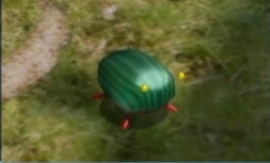Iridescent Flint Beetle: Difference between revisions
Los Plagas (talk | contribs) No edit summary |
Los Plagas (talk | contribs) No edit summary |
||
| Line 40: | Line 40: | ||
==Brawl Trophy Description== | ==Brawl Trophy Description== | ||
"A member of the | "A member of the flint beetle family featuring an iridecent, shining shell that is also prized for its strengh. These beetles are packed with nectar and pellets, which they drop when attacked. These can be collected, although the reason for doing so is unknown. Apparently, Pikmin are quite attracted to these beetles-- the sight of one will send them running after it." | ||
== Trivia == | == Trivia == | ||
Revision as of 16:00, January 5, 2013
| Iridescent Flint Beetle | |
|---|---|

| |
| Appears in | Pikmin, Pikmin 2, Pikmin 3 |
| Scientific name | Pilli envelopens |
| Family | Flint Beetle |
| Areas | The Impact Site, The Forest of Hope, The Forest Navel, Awakening Wood |
| Caves | Citadel of Spiders, Cavern of Chaos, Hole of Heroes, Dream Den |
| Challenge Mode stages | The Impact Site, The Distant Spring, Novice Training |
| Mission Mode Collect Treasure! stages | None |
| Mission Mode Battle Enemies! stages | None |
| Side Story days | None |
| 2-Player Battle stages | None |
| Bingo Battle stages | None |
| Attacks | None |
The Iridescent Flint Beetle is an enemy in both Pikmin games. Attack one by throwing a Pikmin on top of it, at which it glows red while overturning and drops a useful object; Pikmin attacking from on the ground cannot harm it. This creature disappears after a certain amount of time has passed or it has been overturned enough times.
Pikmin
In Pikmin, these bugs look rather larger than in the second game and have a different coloration. They are more common, and are somewhat helpful. They are mostly found in foliage or in corners. When hit, they first drop a 1-pellet, then, when hit again, they drop two doses of nectar. Upon the next direct hit more doses of nectar are released, and then a 5-pellet. This cycle repeats once more, ending after the second 5 -and swift movement. It also poses an indirect threat to Pikmin, as it will often run through Olimar's army. This results in the Pikmin automatically attacking and chasing it unless called back, which can lead them into danger.
Pikmin 2
In Pikmin 2, Pikmin no longer attack Iridescent Flint Beetles automatically as they do in the original game. In all Pikmin 2 Challenge Mode levels they're in, these creatures drop treasures. They are found in similar locations, but only drop three things: a 1-pellet (a dose of nectar if it's underground), 2 doses of nectar, and then a dose of ultra-spicy spray (3 doses of nectar if the Ultra-spicy spray hasn't been discovered yet). Using Purple Pikmin, it is easier to fight them due to the shockwaves that the heavy Purple Pikmin produce when thrown.
As a sidenote, it is possible to defeat these creatures while petrified, but they drop neither nectar nor spray and leave no corpse.
On the main menu, if the player presses Y (Z in the NPC version), an Iridescent Flint Beetle may appear that can be controlled with the C-stick (Gamecube) or the D-pad (NPC). The beetle will be attacked if it gets close to the Pikmin. This is just one of the main menu easter eggs.
Pikmin 3
In Pikmin 3, this creature's appearance is greatly altered. Its eyes are still on stalks, but it sports two antennae that look almost like a mustache, its shiny exoskeleton seems to have layers and appears less shiny, and its underside appears to have four glowing, blue spots. The only way to harm one of these creatures, as with previous games, is by throwing Pikmin on its back, upon which it drops nectar.
Notes
Olimar's voyage log
Reel notes
Olimar's notes
Louie's notes
Strategy
While the Flint Beetle cannot be killed, it can have certain items knocked out of it. The creature can only be attacked with Pikmin, as Captains have no way of damaging this creature. Pikmin must be thrown at the Beetle's shell to flip it, knocking out useful items. The Iridescent Glint Beetle and the Doodlebug are damaged in the same way.
Brawl Trophy Description
"A member of the flint beetle family featuring an iridecent, shining shell that is also prized for its strengh. These beetles are packed with nectar and pellets, which they drop when attacked. These can be collected, although the reason for doing so is unknown. Apparently, Pikmin are quite attracted to these beetles-- the sight of one will send them running after it."
Trivia
- There are two enemies in the Pikmin games similar to the Iridescent Flint Beetle. All are in different families while their genera are the same. In real life, however, it is impossible for members of different families to share a genus.